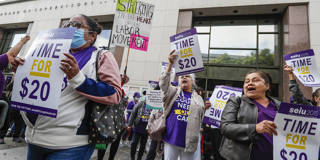At the start of a new year, it is increasingly obvious that new, creative thinking is needed to address climate change, socioeconomic malaise, faltering development strategies, and the breakdown of globalization as we know it. To remain relevant, economists must adapt to new realities and new demands.
CAMBRIDGE – Another tumultuous year has confirmed that the global economy is at a turning point. We face four big challenges: the climate transition, the good-jobs problem, an economic-development crisis, and the search for a newer, healthier form of globalization. To address each, we must leave behind established modes of thinking and seek creative workable solutions, while recognizing that these efforts will be necessarily uncoordinated and experimental.
Climate change is the most daunting challenge, and the one that has been overlooked the longest – at great cost. If we are to avoid condemning humanity to a dystopian future, we must act fast to decarbonize the global economy. We have long known that we must wean ourselves from fossil fuels, develop green alternatives, and shore up our defenses against the lasting environmental damage that past inaction has already caused. However, it has become clear that little of this is likely to be achieved through global cooperation or economists’ favored policies.
Instead, individual countries will forge ahead with their own green agendas, implementing policies that best account for their specific political constraints, as the United States, China, and the European Union have already been doing. The result will be a hodge-podge of emission caps, tax incentives, research and development support, and green industrial policies with little global coherence and occasional costs for other countries. Messy though it may be, an uncoordinated push for climate action may be the best we can realistically hope for.

CAMBRIDGE – Another tumultuous year has confirmed that the global economy is at a turning point. We face four big challenges: the climate transition, the good-jobs problem, an economic-development crisis, and the search for a newer, healthier form of globalization. To address each, we must leave behind established modes of thinking and seek creative workable solutions, while recognizing that these efforts will be necessarily uncoordinated and experimental.
Climate change is the most daunting challenge, and the one that has been overlooked the longest – at great cost. If we are to avoid condemning humanity to a dystopian future, we must act fast to decarbonize the global economy. We have long known that we must wean ourselves from fossil fuels, develop green alternatives, and shore up our defenses against the lasting environmental damage that past inaction has already caused. However, it has become clear that little of this is likely to be achieved through global cooperation or economists’ favored policies.
Instead, individual countries will forge ahead with their own green agendas, implementing policies that best account for their specific political constraints, as the United States, China, and the European Union have already been doing. The result will be a hodge-podge of emission caps, tax incentives, research and development support, and green industrial policies with little global coherence and occasional costs for other countries. Messy though it may be, an uncoordinated push for climate action may be the best we can realistically hope for.